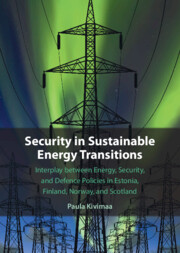Refine search
Actions for selected content:
2 results

Security in Sustainable Energy Transitions
- Interplay between Energy, Security, and Defence Policies in Estonia, Finland, Norway, and Scotland
-
- Published online:
- 23 November 2024
- Print publication:
- 21 November 2024
-
- Book
-
- You have access
- Open access
- Export citation
2 - Understanding Security in the Context of Sustainability Transitions
- from Part I - Theoretical and Literature-Based Foundations
-
- Book:
- Security in Sustainable Energy Transitions
- Published online:
- 23 November 2024
- Print publication:
- 21 November 2024, pp 17-34
-
- Chapter
-
- You have access
- Open access
- HTML
- Export citation
